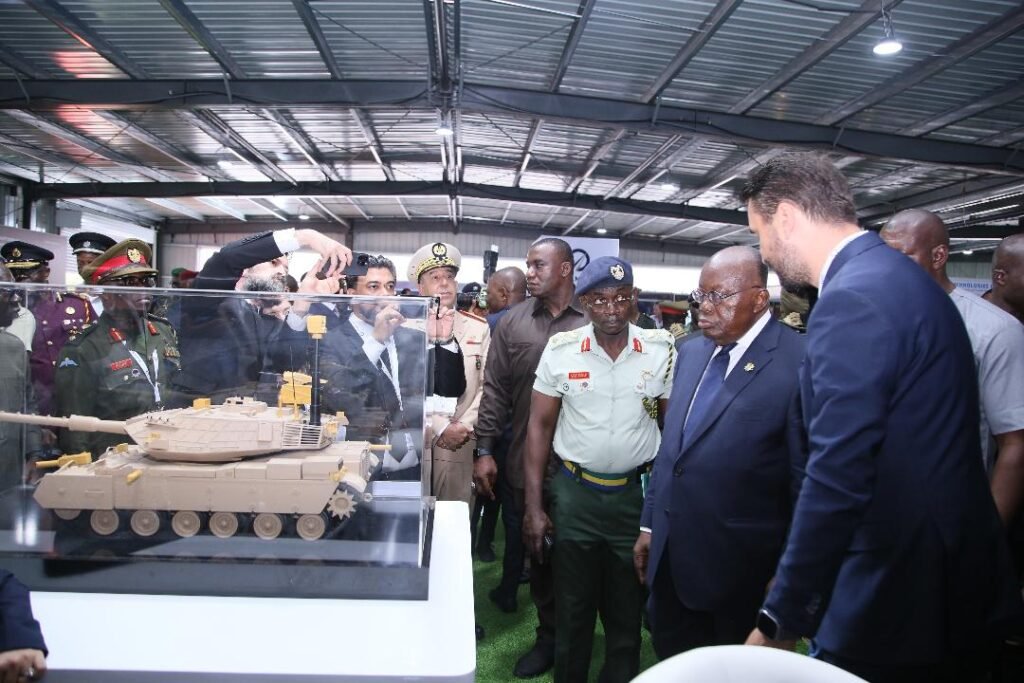ARTICLE AD
President Nana Addo Dankwa Akufo-Addo has reiterated the need for collective and coordinated regional approach in dealing with security threats on the continent.
He said it was imperative that African nations strengthened their regional mechanisms as well as enhance their collaboration, and share intelligence and best practices to create a safer and more secured continent.
 •
President Akufo-Addo (second from right), being briefed by Deniz Yilmaz, Africa Regional Manager, Aselsan (right) on some
•
President Akufo-Addo (second from right), being briefed by Deniz Yilmaz, Africa Regional Manager, Aselsan (right) on some
“The security landscape in Africa is characterised by a variety of threats that are interconnected and often transcend national borders.
Terrorism and violent extremism, for instance, become increasingly pervasive in various regions of the continent. From the Sahel to the whole of Africa, terrorist groups such as Boko Haram, al-Shabaab, and ISIS-affiliated factions like Jenin continue to exploit political instability, economic deprivation, and social grievances to recruit and radicalise our youth and execute terrorist attacks,” he emphasised.
President Akufo-Addo made the call when he opened the 2nd International Defence Exhibition and Conference (IDEC) at Burma Camp in Accra yesterday.
IDEC is a platform that brings together key stakeholders in the defence and security sector to deliberate on issues that are critical to the peace and security of the continent.
It was organised by the military high command of the Ghana Armed Forces in partnership with Great Minds Defense Company and the Gulf of Guinea Maritime Institution.
This year’s was on the theme: “Enhancing Regional Mechanisms for Addressing Contemporary Security Challenges in Africa”.
President Akufo-Addo noted that the theme for this year’s conference was both timely and essential as the country confronted a rapidly evolving security landscape.
He said despite the strides in economic growth and political stability over the few years, the continent continued to grapple with complex security issues such as terrorism, transnational organised crime, maritime piracy, cyber security threats, and the impact of climate change on human security.
The President noted that the issue of transnational organised crime, including illicit activities like drug and human trafficking, arms smuggling, and wildlife poaching continue to pose grave danger to the continent, stressing that “These criminal enterprises undermine economies and fuel corruption and instability, making it difficult for legitimate governance structures to function effectively.”
“The Gulf of Guinea, in particular, has become a global hotspot for piracy, with criminal groups targeting commercial vessels, and holding crew members for ransom. Happily, however, in very recent times, as a result of resolute action by the Nigerian and Ghanaian Navies, the activities of the pirates have been considerably reduced,” he noted.
Chief of Defense Staff (CDS) of the GAF, Lieutenant General Thomas Oppong-Peprah, in his remarks highlighted the importance of the conference in enhancing regional mechanisms to address contemporary security challenges in Africa.
He emphasised the critical role of technological innovation and defense alliances in modern warfare, noting the increasing reliance on advanced tools such as drones, artificial intelligence, and complex communication systems.
The Minister of National Security, Albert Kan-Dapaah, in a speech read on his behalf underscored the increasingly complex nature of global security threats, driven by factors such as globalisation, the rising influence of non-state actors, and rapid technological advancements.
He noted that these dynamics have introduced a range of new challenges, including human trafficking, narcotics, smuggling, and illegal immigration, which threaten not only individual nations but the global community at large.
In light of these challenges, he argued that no single nation, regardless of its power, can effectively tackle these challenges alone. Instead, he advocated for collective security through strategic alliances and regional cooperation.
BY CLIFF EKUFUL & STEPHANIE BIRIKORANG

 2 months ago
16
2 months ago
16 

